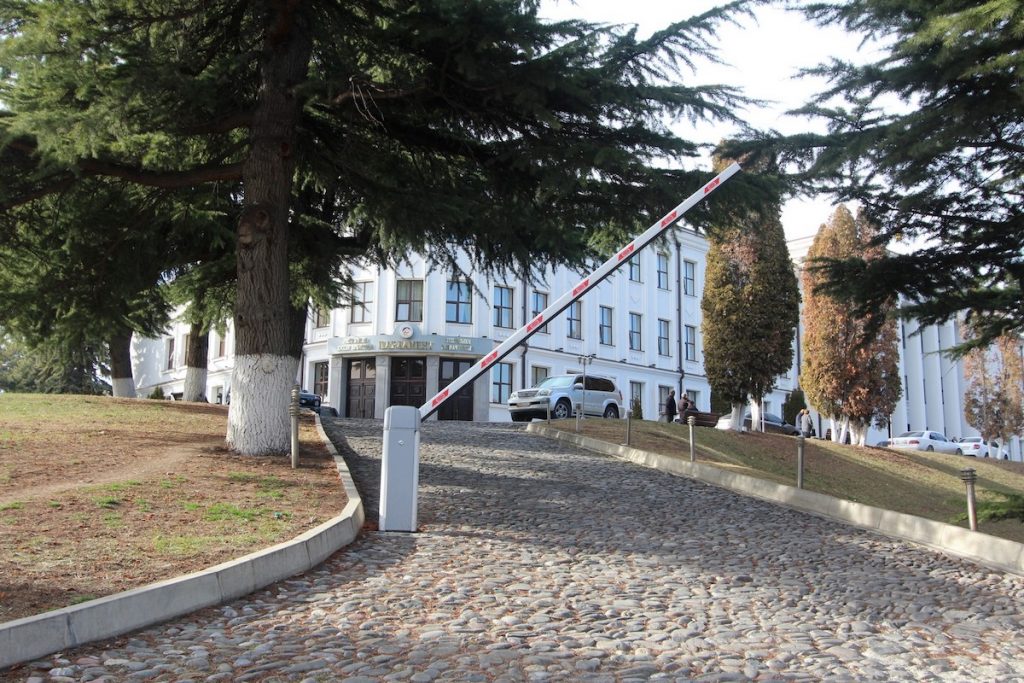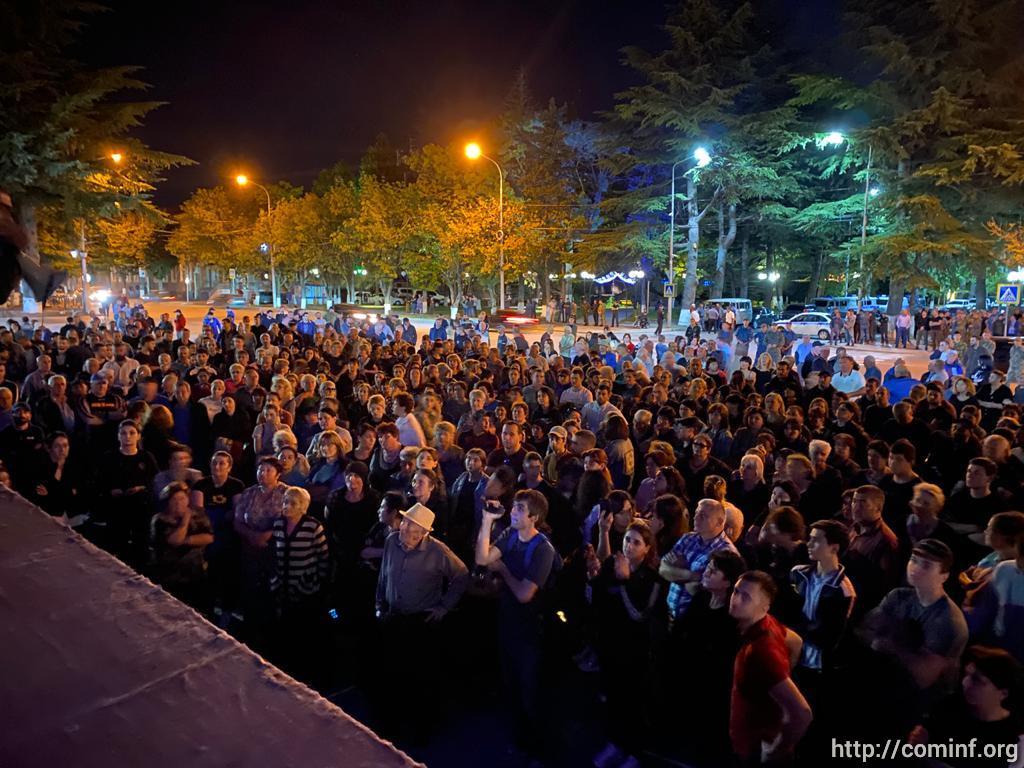S. Ossetian opposition ends parliament boycott following constitutional reform promise
In South Ossetia, the opposition has stopped its boycott of parliament, which lasted six months, although it did not achieve the main demand: the resignation of the prosecutor general.
MPs have returned to discussions with the authorities, and the president announced a constitutional reform. However, the society is skeptical about the prospect of the decentralization of power

Parliament first met in full force since September 2020 in March 2021. Returning to parliamentary work is seen by the opposition as an important step, as it is one of the few ways to control the government.
At the meeting, the chairman of the government was approved, Gennadi Bekoev.
However, MPs did not manage to come to an agreement on the most acute issue – the recognition of the unauthorized session of parliament on February 16. Then, due to the boycott of the opposition, there was no quorum at the meeting. But the assembled 18 pro-government MPs nevertheless, in violation of the regulations, approved the budget for 2021.
Let’s understand the confused situation in South Ossetia: why the opposition declared a boycott of parliament, why it returned, and what could be the further development of events.
The death of 30-year-old Jabiev and the MPs’ protest
A group of opposition MPs has boycotted the work of parliament since September 7, 2020 in response to the president’s refusal to submit to parliament the question of the resignation of the republic’s prosecutor general Uruzmag Dzhagaev.
The reason for this demand of the deputies was the story of Inal Dzhabiev, a 30-year-old resident of South Ossetia arrested on charges of involvement in the assassination attempt on Interior Minister Igor Nanayev, which took place on August 18, 2020.
And about a week after that, he died during an interrogation. Photos of his body with traces of cruel torture have since circulated on social media.
Mass protests erupted in Tskhinval, and the authorities announced the start of an investigation led by the prosecutor general. However, it is he who is blamed by the family of the deceased and the majority in society in general.
- Protests in South Ossetia resume after funeral of 28-year-old, president alleges ‘a Georgian trace’ in rallies
- “Do they want to intimidate MPs?” – 200 security officers in camouflage, with arms attended parliament session in South Ossetia
- Around 20 prisoners cut their wrists in South Ossetian penal colony
The aforementioned letter addressed to the president was then signed by 23 out of a total of 34 MPs And the work of the parliament turned out to be completely paralyzed, since at least 2/3 of the number of MPs must be present at the sessions.
The proposal to ignore the law was made by none other than the President of South Ossetia Anatoly Bibilov. On February 12, he came to parliament and said that “the rules are not the law.”
“Do not wait for those who do not think about the people. Do what you have to do for your people…. Even if we go against the regulations a little, we will do it for the sake of thousands of people, these people will thank us,” Bibilov said.
The MPs did just that, and adopted the budget without a quorum. The issue continues to be at the center of attention both among the opposition and in society.
Jabiev’s family stopped street protest, MPs will continue to fight in parliament
The resignation of the Prosecutor General was the main demand of the permanent street protest of the Inal Dzhabiev family. However, after spending almost three months on the square in the center of Tskhinvali, on February 26, his wife and mother were forced to stop the rally, failing to achieve their demand.
This happened after the mother of the deceased, Maia Tsiskadze, was hospitalized with a hypertensive crisis. The ambulance took her away straight from the square.
“We are leaving, but that does not mean that we have stopped fighting. On the contrary. I think people will be next to us. We all have children, I myself have two sons. Why should I be afraid that they will grow up and suffer the fate of their father? We all have to fight,” said the wife of the deceased, Oksana Sotieva.
The family intends to reach a fair conclusion about the cause of death. A medical examination, carried out in the Russian city of Rostov-on-Don, says that Inal Dzhabiev died from withdrawal symptoms, that is, from the “withdrawal of a drug addict.” However, South Ossetian pathologist Zarina Dzagoeva concluded that Dzhabiev died of “heart failure as a result of the trauma he received.”
The family, many in society and opposition deputies believe that it is the prosecutor Uruzmag Dzhagaev who does not allow a fair investigation, and therefore insist on his resignation.
‘Return parliamentary work to lawfulness’
After returning to parliament after the boycott, MPs from the opposition parties Nykhas and the People’s Party came up with an initiative to recognize the decisions of the parliamentary session that ignored the quorum requirements as unauthorized, and then re-consider issues, including the budget.
However, those 18 deputies who violated the regulations did not agree that their actions violated the law. The question, like the conflict, remains open.
“There is no crisis, you just need to update the Constitution” – President Bibilov
President of South Ossetia Anatoly Bibilov continues to insist that there is no political crisis in South Ossetia, and stated this once again during an interview on the air of the Ir TV channel. Then he spoke in favor of the adoption of a new Constitution.
He called the reason “internal contradictions”, in particular, the inoperative norm on local authorities.
So far, the parliamentary opposition has not commented on the idea of constitutional reform. Only the non-parliamentary party “Fydybasta” spoke out, which agreed that the constitution “fulfilled its historical mission” and should be updated.
The main problem in the party was called the excessive centralization of power, “which became the basis for building a tough authoritarian regime in South Ossetia, and now is one of the main catalysts of the socio-political crisis.”
Many in South Ossetia, nevertheless, believe that by announcing the reform, Anatoly Bibilov does not mean at all an intention to share power. The events of recent months are quite clear about this.
Meanwhile, there is not much more than a year before the next presidential elections, which are scheduled for April 2022. And never before in South Ossetia has the situation been so tense long before the elections.
Toponyms, terminology, views and opinions expressed by the author are theirs alone and do not necessarily reflect the views and opinions of JAMnews or any employees thereof. JAMnews reserves the right to delete comments it considers to be offensive, inflammatory, threatening or otherwise unacceptable



















